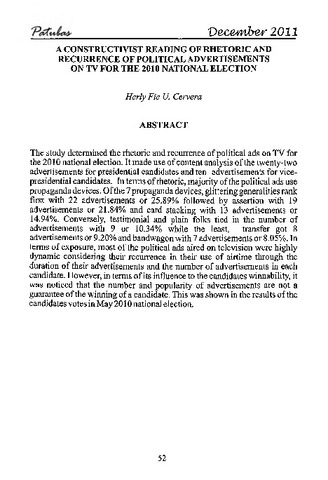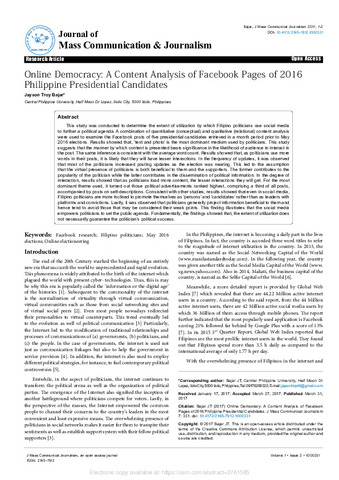A constructivist reading of rhetoric and recurrence of political advertisements on TV for the 2010 national election
Аннотации
The study determined the rhetoric and recurrence of political ads on TV for the 2010 national election. It made use of content analysis of the twenty-two advertisements for presidential candidates and ten advertisements for vice-presidential candidates. In terms of rhetoric, majority of the political ads use propaganda devices. Of the 7 propaganda devices, glittering generalities rank first with 22 advertisements or 25.89% followed by assertion with 19 advertisements or 21.84% and card stacking with 13 advertisements or 14.94%. Conversely, testimonial and plain folks tied in the number of advertisements with 9 or 10.34% while the least, transfer got 8 advertisements or 9.20% and bandwagon with 7 advertisements or 8.05%. In terms of exposure, most of the political ads aired on television were highly dynamic considering their recurrence in their use of airtime through the duration of their advertisements and the number of advertisements in each candidate. However, in terms of its influence to the candidates winnability, it was noticed that the number and popularity of advertisements are not a guarantee of the winning of a candidate. This was shown in the results of the candidates votes in May 2010 national election.
Описание
Journal article
Suggested Citation
Cervera, H. F. U. (2011). A constructivist reading of rhetoric and recurrence of political advertisements on TV for the 2010 national election.Type
ArticleISSN
1908-515XТематика
Keywords
Collections
- Journal articles [36]
- Patubas [110]
The following license files are associated with this item:
Except where otherwise noted, this item's license is described as Attribution-NonCommercial-NoDerivs 3.0 Philippines
Связанные элементы
Просмотр элементов, связанных по названию, автору, создателю или теме.
-
An analysis of presidential candidates’ Facebook posts during the 2022 Philippine National Election
Palcullo, Vince Ervin V. (Faculty of Arts, Chulalongkorn University, 2023)The 2022 Philippine National Election witnessed a significant shift in political communications and campaigning strategies due to the utilization of Facebook. Utilizing the Facebook posts of Ferdinand “Bongbong” Marcos, ... -
Political communications and promotions: Its influence to the voting inclination and preference of perceived candidates of the residents of the city of Iloilo
Tupas, Nielex C. (2009)This study aimed to determine the extent of influence of political communication and promotions to the voting inclination and preference of candidates. The research is descriptive-relational as it describes certain ... -
Online democracy: A content analysis of Facebook pages of 2016 Philippine presidential candidates
Bajar, Jayson Troy F. (Hilaris, 2017)This study was conducted to determine the extent of utilization by which Filipino politicians use social media to further a political agenda. A combination of quantitative (conceptual) and qualitative (relational) content ...






